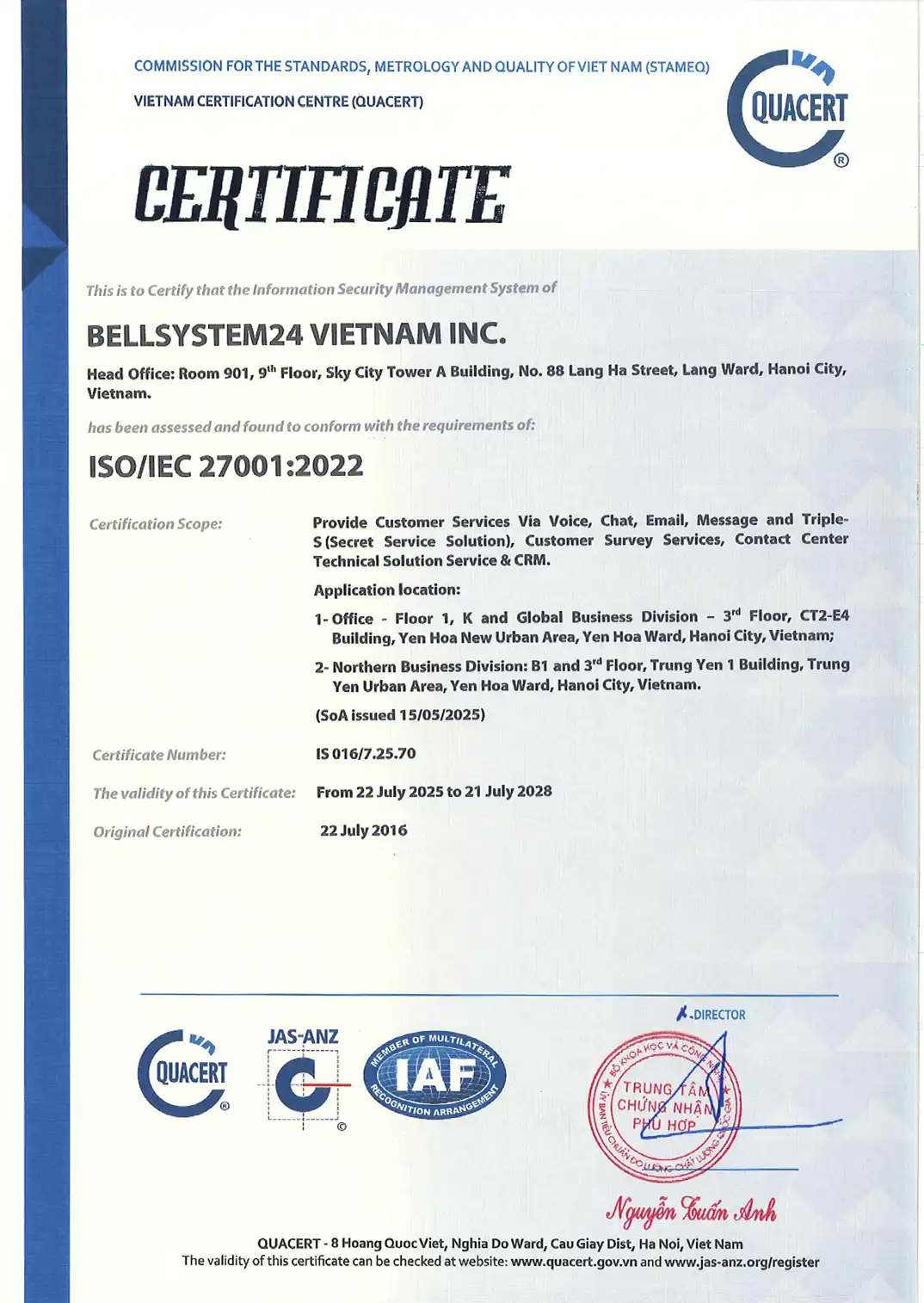How to calculate the price of outsourced telesales
Outsource telesales team is a popular choice for businesses seeking to optimize costs and increase sales efficiency. When outsourcing telesales, there are two main pricing models: per-call pricing and per-hour pricing. fixed costs (salaries and insurance premiums) and calculated based on incentive (performance-based pay)Below are details about each method along with reference salaries.
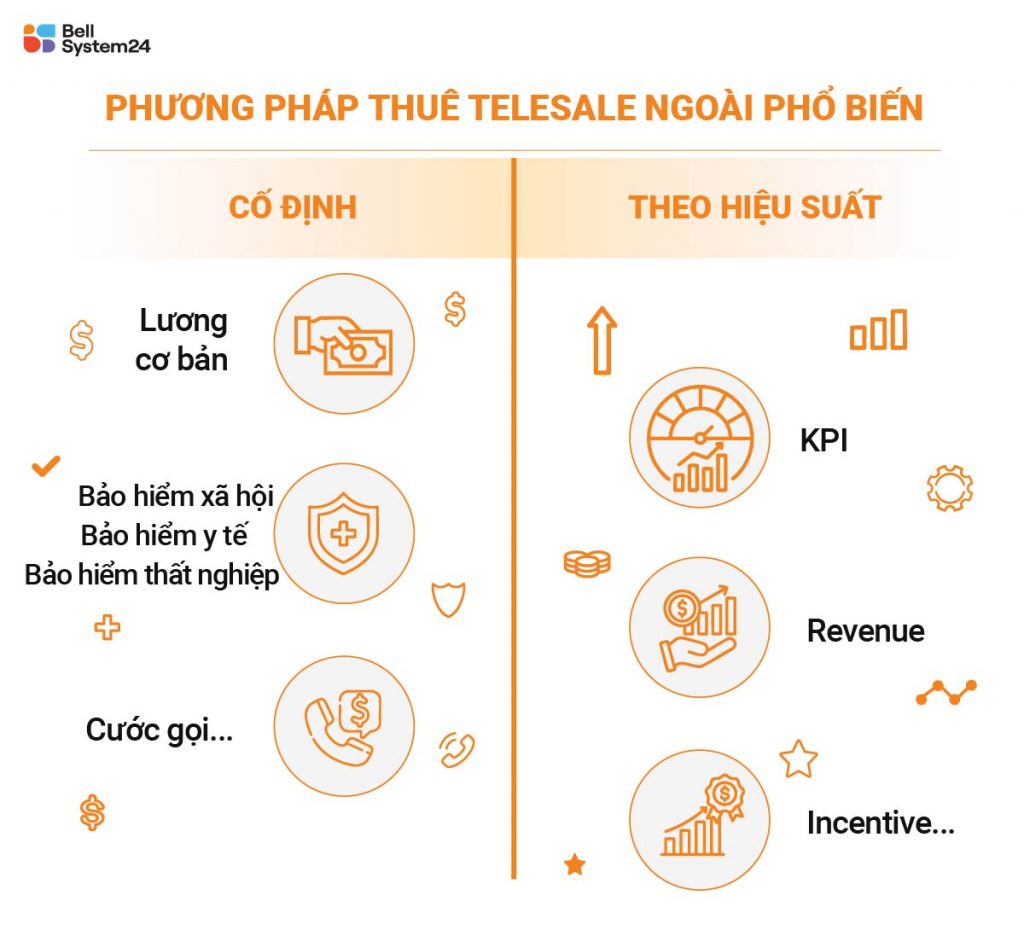
How to calculate telesales rental fees based on fixed costs
This model is based on paying telesales employees a fixed monthly salary, along with statutory benefits.
The expenses include:
- Basic salaryThe salary is agreed upon in advance and paid monthly.
- Social insurance (BHXH), health insurance (BHYT), unemployment insurance (BHTN): The total insurance costs paid for employees usually account for approximately 21.51 TP3T gross salary.
- Training costsIf outsourcing telesales, the company may have to pay training or management fees.
- Other expensesIncludes support for work tools, phones, internet, etc.
Market reference salary:
Telesales salaries depend on experience, field, and company size. Below are average salaries based on common criteria:
- Telesales with no experience required: 5–7 million VND/month.
- Experienced telesales with 1-2 years of experience: 7-10 million VND/month.
- High-level telesales (good closing skills, B2B sales, finance, insurance, etc.): 12–20 million VND/month.
- Telesales Team Leader: 15–25 million VND/month.
Specific example:
- A company hires experienced telesales staff with a salary of 10 million VND per month.
- Insurance premiums (21.5%) = 2.15 million VND.
- Training costs, other support = 1.5 million VND.
- Actual total cost: 13.65 million VND per month per person.
How to calculate telesales fees based on performance (incentive)
This model is based on the effectiveness of telesales, where the base salary is lower but there is revenue-based bonuses, KPI achievement.
Common calculation method:
- Base salary: 4–6 million VND/month (lower than the fixed model)
- Commission on revenue: Typically ranges from 21% to 101% of the contract value, depending on the industry.
- KPI-based rewards: May include the number of successful calls, the number of orders closed, and the contract value achieved.
Some reference examples
1. Telesales by service
| Services | Detail | Price (VND) |
|---|---|---|
| Telephone survey | Long script (AHT 8 - 10 min) | from 45,000 |
| Short script (AHT) (under 2 min) | from 10,000 | |
| Data verification | Verification failed (AHT ~ 1 min) | from 5000 |
| Verification successful (AHT ~2 min) | from 10,000 | |
| Telemarketing | Short script (5 minutes) | from 20,000 |
| Long script (10 minutes) | from 45,000 | |
| AHT: Average handling time is the average time spent handling a call. | ||
2. Telesales by industry (e.g., insurance, real estate)
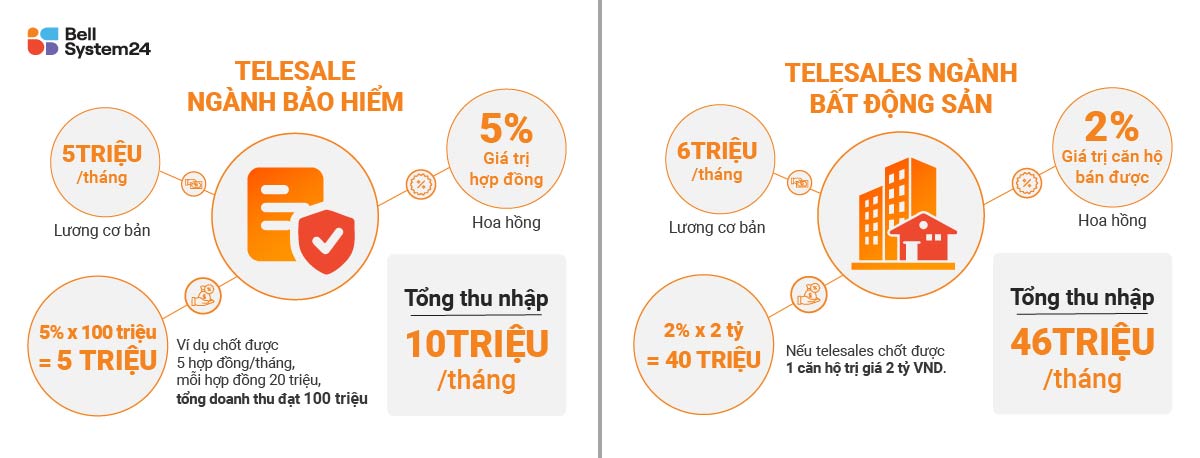
In addition to the two common calculation methods above, businesses can also calculate the price of a full-service telesales package for each specific campaign.
Factors affecting telesales prices
1. Industry and business sector
Each industry has its own unique characteristics, requiring different levels of expertise and skills from the telesales team. Fields such as finance, insurance, and real estate often require telesales staff to have in-depth knowledge and advanced consulting skills, leading to higher service costs. Conversely, retail or consumer services industries may require a lower level of expertise, resulting in lower costs.
2. Customer data quality
A high-quality customer list, with accurate and up-to-date information, helps increase conversion rates and reduce outreach time. Providing quality customer data from the business side can help reduce telesales service costs by improving work efficiency. Conversely, poor-quality data can lead to many ineffective calls, increasing costs due to wasted time and resources.
3. Experience and expertise of the telesales team
Experienced and well-trained telesales staff often deliver higher effectiveness in reaching and persuading customers. Therefore, the cost of telesales services with a professional team is typically higher than that of a less experienced team. However, investing in a quality team can yield long-term benefits through increased conversion rates and revenue.
4. Campaign duration and scale
Long-term, large-scale telesales campaigns often receive preferential pricing from service providers. Long-term contracts help stabilize the workload for providers, allowing them to offer more competitive prices to businesses. Conversely, short-term or small-scale campaigns may not receive the same preferential pricing.
5. Assistive technology
The application of advanced technologies such as Customer Relationship Management (CRM) systems, artificial intelligence (AI) in data analysis, and call automation can increase the effectiveness of telesales operations. Although the initial investment in technology may increase costs, in the long run, it helps optimize processes, minimize errors, and increase success rates, thereby reducing overall costs.
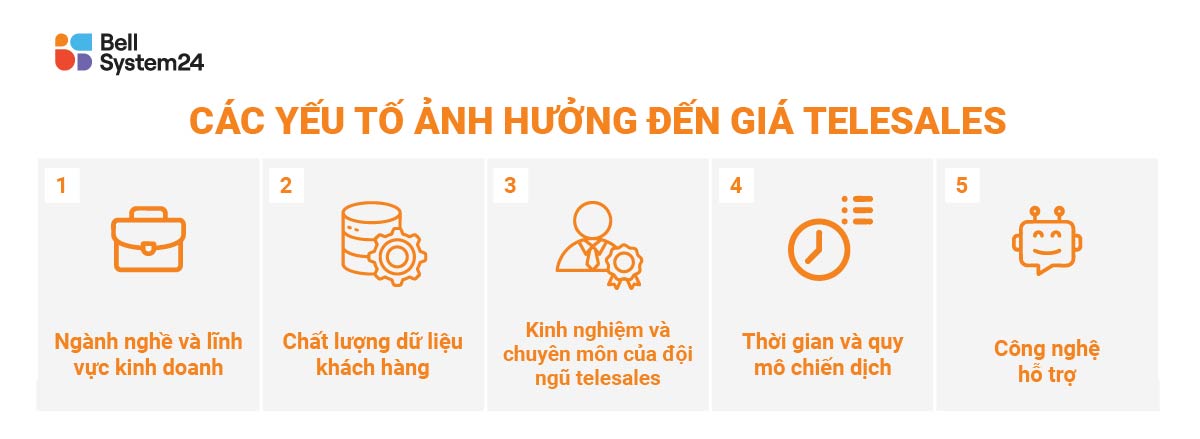
Additionally, telesales costs are influenced by the level of personalization in customer outreach. A specialized telesales service that personalizes each call may incur higher costs but delivers greater effectiveness.
Compare telesales costs when outsourcing versus building an in-house team
The decision between outsourcing and building an in-house telesales team has a significant impact on business costs. Below is a comparison of telesales costs between these two options:
| Criteria | Outsource telesales | Build your own telesales team |
|---|---|---|
| Fixed costs | Depending on the outsourced telesales package, there may or may not be fixed costs. | Includes: Salary, bonuses, insurance, office space |
| Training costs | No training required | Initial training costs and ongoing maintenance |
| Scalability | Flexible, easy to expand | Recruitment takes a lot of time |
| Support technology | Supplier | Businesses must invest |
| Operational efficiency | High productivity thanks to expertise | May be unstable |
In addition to costs, businesses also need to consider long-term effectiveness. If they build their own telesales team, businesses can better control call quality. However, this requires significant investment in personnel, training, and technology.
When should you hire telesales?
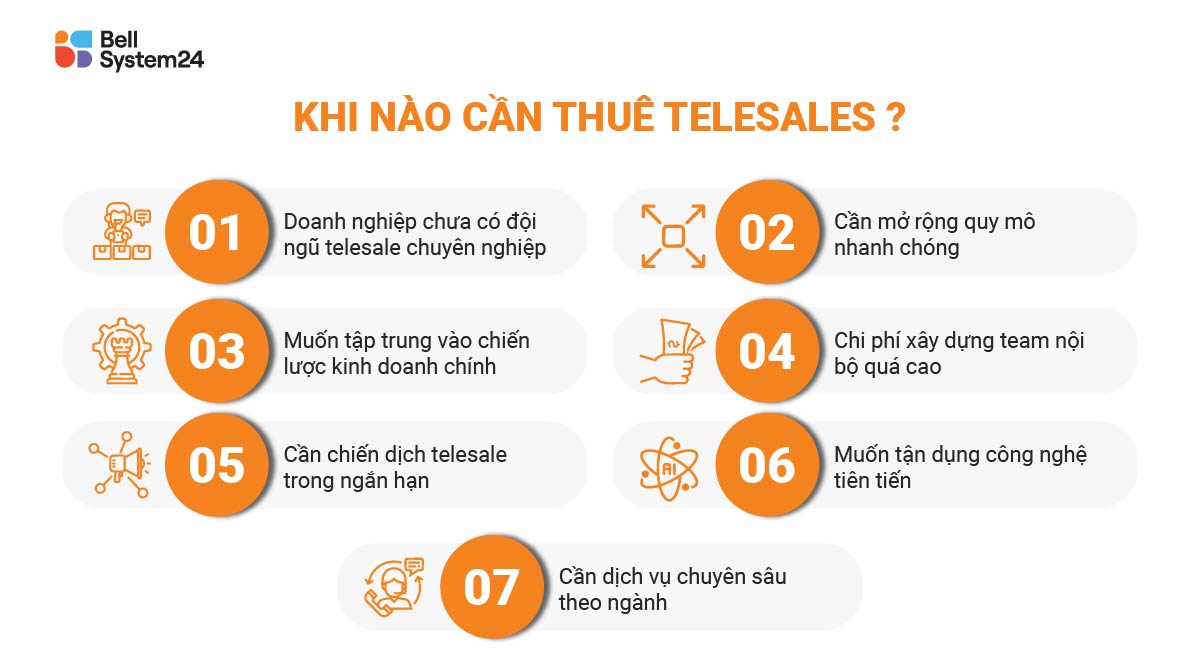 When should a business consider outsourcing telesales? Businesses do not always need to outsource telesales services. Below are situations where businesses should consider outsourcing to optimize telesales costs:
When should a business consider outsourcing telesales? Businesses do not always need to outsource telesales services. Below are situations where businesses should consider outsourcing to optimize telesales costs:
- Businesses that do not have a professional telesales team: If you don't have specialized personnel, outsourcing can be a time- and cost-saving solution.
- Need to scale up quickly: If a business needs to reach more customers in a short period of time, outsourcing will help accelerate the process without requiring a large investment.
- Want to focus on core business strategy: Outsourcing helps businesses focus on more important activities such as product development and marketing strategy.
- The cost of building an internal team is too high: If a business finds that the cost of internal telesales exceeds its budget, outsourcing is a more reasonable option.
- Need a short-term telesales campaign: If a business only needs telesales for a temporary campaign, outsourcing will result in significant savings.
- Want to leverage advanced technology: Telesales service providers often use modern technologies such as AI, chatbots, and CRM to optimize work performance.
- Need specialized services by industry: Certain fields such as insurance, healthcare, and finance require telesales representatives to possess specialized skills. Outsourcing allows businesses to immediately access a professional team without the need for training from scratch.
Conclusion
Telesales pricing is a crucial factor that businesses must consider when deciding between outsourcing or building an in-house team. Understanding how telesales pricing is calculated, the factors that influence it, and the differences between the two options will help businesses optimize costs and achieve maximum business efficiency. If a business wants flexibility, cost savings, and improved performance, outsourcing telesales is an option worth considering.






